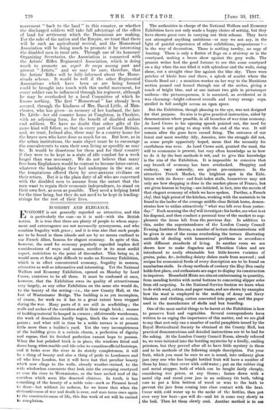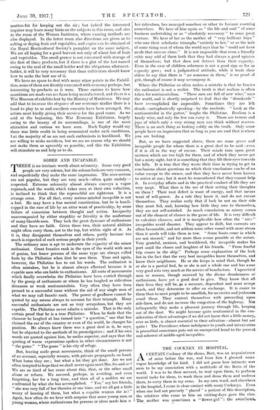ECONOMY AND ELEGANCE.
VCONOMY is not generally regarded as attractive, and this is particularly the case—so it is said—with the British nation. It is true that there are plenty of people to whom enjoy-
ment and extravagance are not necessarily synonymous, and who combine frugality with grace ; and it is true also that such people are to be found in these islands and are by no means confined to our French Allies, famous for elegant economy. In spite of this, however, the need for economy popularly regarded implies dull considerations of ways and means, sacrifice in its most sordid aspect, restriction to the point of discomfort. This being so, it would seem at first sight difficult to make an Economy Exhibition, which is in effect concentrated economy, frugality in essence, attractive as well as informative and interesting. Yet the National Welfare and Economy Exhibition, opened on Monday by Lord Crewe, contrives to be all three. It must be confessed at once, however, that the Exhibition owes its quality of attractiveness very largely, as any other Exhibition on the same site would do, to the beauty of the setting—i.e., the new County Hall, at the foot of Westminster Bridge. The building is as yet incomplete, of course, for work on it has to a great extent been stopped during the war. Many parts of it are still in scaffolding ; the walls and arches of the corridors still in their rough brick ; masses of building material lie heaped in corners ; old riverside warehouses, the work of demolition hardly begun, block the view at certain points ; and what will in time be a noble terrace is at present tittle more than a builder's yard. Yet the very incompleteness of the building gives it a certain charm, a perfection of dignity and repose, that its finished perfection cannot hope to possess. When the last polished brick is in place, the windows fitted and doors hung, when marble and tile echo to countless official footsteps, and it looks over the river in its stately completeness, it will be a thing of beauty and also a thing of pride to Londoners and all who love London, but it will have lost that peculiar beauty which now clings to the walls, already weather-stained, to the wide windowless casements that look into the sweeping courtyard or over the river to Westminster, or the bare arched roof of the corridors which seem like deserted cloisters. In truth, it has something of the beauty of a noble ruin—suck as Piranesi loved to draw--but without its sadness, for we know that when the destructiveness of war and death is over, and man turns once again to the constructiveness of life, this fine work of art will be carried to completion. The authorities in charge of the National Welfare and Economy Exhibition have not only made a happy choice of setting, but they have shown great care in carrying out their scheme. They have not attempted anything ambitious—or may we not say, in the light of painful experience of other exhibitions, preposterous T- in the way of decoration. There is nothing tawdry, no orgy of bunting. There is only a flutter of flags on a stairway or in the courtyard, making a brave show against the grey walls. The present writer had the good fortune to see this same courtyard on a day when the sun filled it with splendour and the walls, rising sheer, cut a straight clear line against the blue sky. There were patches of khaki here and there, a splash of scarlet where the Guards Band sat ; a munition-worker on her way to the Munitions section paused and leaned through one of the arches, giving a touch of bright blue, and at one instant two girls in picturesque uniform—the picturesqueness, it is surmised, as accidental as it was charming—bright-coloured overalls and tawny orange caps, strolled in full sunlight across an open space.
But the Exhibition, though pleasing to the eye, was not designed for that purpose. Its aim is to give practical instruction, aided by demonstration where possible, in all branches of war-time economy. As Lord Crewe in his opening speech pointed out, the need for economy is not going to stop with the end of the war. It will remain after the guns have ceased firing. The entrance of our latest and most wealthy Ally, America, into the struggle did not, as some people apparently hoped, mean that the necessity for carefulness was over. As Lord Crewe said, granted the need, the will to economize is present, but very often knowledge as to how to do it by the best methods is not, and to give this knowledge is the aim of the Exhibition. It is impossible to conceive that any branch of economy has been overlooked. Shopping and cookery, very naturally, are given pre-eminence. In the attractive French Market, the brightest spot in the Exhi- bition with its flower- and fruit-laden stalls, housewives may not only see how shopping is done in the market-places of France, but are given lessons in buying—are initiated, in fact, into the secrets of that elegant economy of which we have spoken. Further, a French chef, that high priest of the kitchen, working with the materials to be found in the larder of the average middle-class British home, demon- strates how to utilize attractively " what was left over from yester- day." Each morning the chef will investigate his larder, see what is at his disposal, and then conduct a personal tour of the market to sup- plement the items left from the previous day. In addition to this, under the superintendence of the London County Council Evening Institutes Bureau, a number of lecture-demonstrations will be given in one of the rooms overlooking the terrace illustrating methods of dealing with housewives' problems in accordance with different standards of living. In another room we are shown how to make Sugarless and Wheatless Cakes and are introduced to easily obtainable but little-known varieties of grains, pulse, &c., including dainty dishes made from seaweed ; and recipes for economical foods of every description are to be found on numberless stalls. In cheap methods of cookery the Hay-Box easily holds first place, and enthusiasts are eager to display its construction to inquirers. Household Hints are almost embarrassing in quantity. from mending kettles with metal buttons to concocting slipper soles
from old carpeting. In the National Service Section we learn what to do with wool, cotton, and paper waste, and are shown by examples how the wool is employed in the making of Army and Navy blankets and clothing, cotton converted into paper, and the paper used in the manufacture of shells and box boarding.
One of the most useful things to be learnt at the Exhibition is how to preserve fruit and vegetables. Several correspondents have written to us urging the importance of this matter, and we are glad to say that not only can a number of useful pamphlets issued by the Royal Horticultural. Society be obtained at the County Hall, but practical demonstrations and detailed instructions are to be had for the asking. At the London County Council Room, already referred to, we were initiated into the bottling mysteries by a kindly, smiling priestess, but they proved after all to have little mystery in them and to be methods of the following simple description. Put your fruit, which you must be sure to see is sound, into ordinary glass jars (any one who has bought bottled fruit will have a number of these by him); then cover with cold water ; put on the rubber ring and metal stopper, both of which can be bought fairly cheaply, considering war prices, at any Stores ; fasten down with a metal clip and stand your jars in an ordinary tin bath, taking care to put a false bottom of wood or wire to the bath to prevent the jars from coming into close contact with the heat,. Cover with cold water up to the necks of the bottles, then put over very low heat—gas will do—and let it come very slowly to the boil. Then let them slowly cool. Another method is to USD
mutton-fat for keeping out the air ; but indeed the interested inquirer may learn many hints on the subjects in this room, and also in the room of the Women Institutes, where canning methods are also displayed. In the latter room also directions are given as to salting or drying fruit and vegetables, and copies can be obtained of the Royal Horticultural Society's pamphlet on the same subject. We are all hoping for a good harvest not only of wheat but of fruit and vegetables. The small grower is not concerned with storage of the first of these products, but if there is a glut of the last named owing to the zeal of the small-holder and the ubiquitous allotment- holder, it will be very necessary that these cultivators should know how to make the best use of it.
We have no space to deal with many other points in the Exhibi- tion, some of them not directly concerned with economy perhaps, but interesting by-products as it were. Those curious to know how munitions are made can see fuses being manufactured, and the re is a War Museum of exhibits lent by the Ministry of Munitions. We may add that to increase the elegance of our economic studies there is a band to play to us and excellent concerts have been arranged, the artists most kindly giving their services for the good cause. As we said at the beginning, this War Economy Exhibition, largely owing to the beauty of its surroundings, is one of the most attractive and curious we have seen. Mark Tapley would Ray there was little credit in being economical under such conditions, l.ut the majority of us are not such enthusiasts in hardihood. We are willing to make sacrifices, but we see no reason why we should not make them as agreeably as possible, and this the Exhibition will stimulate us and help us to do.



































 Previous page
Previous page